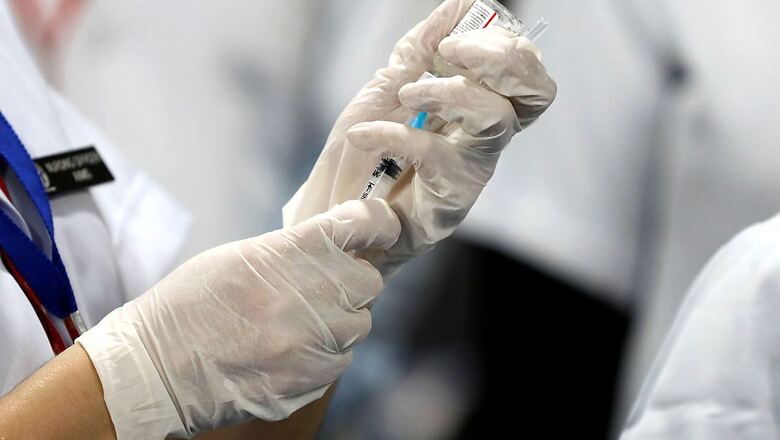
views
Many claims about the Covid-19 disease, and vaccination are being shared online. Most have no truth to them, and work with discouraging people from receiving their life-saving jab, or not taking the pandemic seriously enough to take necessary precautions.
News18 has compiled a list of such claims and what the truth behind them is. Read on to know:
CLAIM: COVID-19 vaccines have resulted in some people becoming magnetic.
TRUTH: Covid-19 vaccines do not cause magnetism in bodies.
Explained: In recent weeks, videos have circulated on social media, especially in India, falsely claiming that metal objects shown hanging on peoples bodies were the result of magnetism created by COVID-19 vaccines or microchips.
A new video claims that magnetism was added to the vaccine in order to make the messenger RNA move throughout the body. The Press Information Bureau’s (PIB) fact-checking arm, PIB Fact Check said these claims about Covid-19 vaccines are “baseless”.
“Vaccines cannot cause a magnetic reaction in the human body. COVID-19 vaccines are completely safe and do not contain any metal-based ingredients. It is common to experience mild side-effects like mild headaches, pain or swelling at the injection site, and mild fever after getting the COVID-19 vaccine,” it said. “Do not fall prey to misinformation about COVID-19 vaccines and get vaccinated,” added.
The video shows a 71-year-old man from Nashik, Maharashtra, who claims items are stuck to his arm after receiving the second dose of the vaccination. After receiving the second jab, Arvind Sonar can be seen putting coins and steel to his arm in a now-viral video.
Receiving a COVID-19 vaccine will not make you magnetic, including at the site of vaccination which is usually your arm, the agency posted on its website. In addition, the typical dose for a COVID-19 vaccine is less than a milliliter, which is not enough to allow magnets to be attracted to your vaccination site even if the vaccine was filled with a magnetic metal.
CLAIM: COVID-19 vaccines make people produce a spike protein that is a toxin and can spread to other parts of the body and damage organs.
TRUTH: Spike protein produced by vaccine is not toxic.
THE FACTS: A peplomer, also known as a spike, is a knoblike structure made up of glycoproteins that protrudes from the lipid bilayer of an enveloped virus’s surface. COVID-19 vaccines do instruct the body to produce spike proteins that teach the immune system to combat the spikes on the coronavirus, but experts say these proteins are not toxic and do not damage organs.
The spike protein is immunogenic, meaning it causes an immune response, but it is not a toxin, said William Matchett, a vaccine researcher at the University of Minnesota Medical School in the US.
Dr. Byram Bridle, an associate professor in viral immunology at the University of Guelphs Ontario Veterinary College, forwarded the fringe theory about the spike protein being a toxin during a radio interview with Alex Pierson in Ontario, Canada.
“We made a big mistake. We didn’t realize it until now, we thought the spike protein was a great target antigen. We never knew the spike protein itself was a toxin and was a pathogenic protein so by vaccinating people we are inadvertently inoculating them with a toxin,” said Bridle, who described himself as pro-vaccine.
But scientists and researchers say that is not the case. Dr. Daniel Kaul, an infectious disease expert at the University of Michigan, noted that the vaccines have been proven safe and effective through clinical trials and the millions of people who have so far received the vaccines in the U.S.
In terms of the spike protein itself being pathogenic in some way that’s just simply not true, he said in response to Bridles claims. All the vaccines that received emergency use authorization in the U.S. do not contain live COVID-19 virus. Nor do they contain actual spike protein from the virus, which is what allows the virus to easily infect the human cell and replicate.
The vaccines work by teaching the immune system to identify and fight off the spike protein in the body. The Pfizer and Moderna vaccines rely on messenger RNA, often referred to as mRNA, that delivers a set of instructions to create spike proteins so your body can learn to combat them.
Unlike the mRNA vaccines, the Johnson & Johnson vaccine carries its genetic instructions for the spike protein through a modified adenovirus. Posts online shared quotes of Bridles interview to further push the false narrative that COVID-19 vaccines are dangerous and attack the body.
In the interview, Bridle says that the spike proteins generated by the vaccines don’t stay in the shoulder muscle, but spread and cause so much damage in other parts of the bodies of the vaccinated. But Dr. Adam Ratner, a pediatric infectious disease specialist at NYU Langone Health, said that vaccines are mostly concentrated at the site of injection or the local lymph nodes.
What was said in the radio show was completely inaccurate, Ratner said. There is no spike protein in the vaccines first of all. The amounts that are made after the mRNA is injected are very small and it almost exclusively stays locally. It is nowhere near the amount he was talking about. Bridle did not respond to requests for comment from The Associated Press.
An auto-reply email from his account said that a more comprehensive report on his comments would soon be published. My answer to the question posed by the host was objective and founded on multiple reliable scientific sources, the email reads.
CLAIM: Coronavirus cases without symptoms aren’t real. An asymptomatic patient is simply a healthy person.
TRUTH: Asymptomatic COVID-19 infections do occur.
THE FACTS: Posts liked thousands of times on Instagram this week are falsely claiming that asymptomatic COVID-19 cases do not exist. In case anyone is still confused – an asymptomatic person is a healthy person, the posts read.
Never in the history of acute respiratory illnesses have we declared cases without any indication of symptoms. Its called a false positive. The end.
In fact, asymptomatic COVID-19 infections do occur and are a key feature of the virus, according to the United States’ CDC and several experts consulted by The Associated Press.
We know that asymptomatic infections occur based on at least two facts, said Jade Fulce, public affairs specialist at the United States’ CDC.
First, she said, the virus has been isolated by culture from persons who have tested positive but never develop symptoms. Second, she said, there are well documented cases of infected persons who are asymptomatic who have transmitted infection.
Though false positive and negative tests can occur, the risk of such errors is low in most of the tests authorized for use by the FDA, Fulce said.
Furthermore, false positives due to lab errors are not the same as asymptomatic cases. Though estimates vary, researchers who reviewed the available published data in May 2021 said that at least one-third of people who become infected with the coronavirus likely did not experience symptoms.
This occurs pretty frequently, said Dr. Roger Shapiro, an associate professor of immunology and infectious diseases at Harvard Medical School and Harvard T.H. Chan School of Public Health.
We would not expect our tests to have false positives to that high of a percentage. Other viruses, including other respiratory viruses, have also been identified in individuals who never developed symptoms, said Dr. Panagis Galiatsatos, an assistant professor in the division of pulmonary and critical care medicine at Johns Hopkins University School of Medicine.
Asymptomatic can occur 100%, Galiatsatos said. There’s countless cases where an upper respiratory virus never gives you symptoms but still can be highly contagious. There’s many viruses that have done that, and other coronaviruses possibly in the past, as well, have done that.
Experts say when we talk about asymptomatic COVID-19 patients, we are actually talking about two different types of patients. There are patients who are truly asymptomatic and never develop symptoms. Then there are patients who dont develop symptoms at first, but later do. “We do consider presymptomatic people more infectious,” Shapiro said. “They have virus that’s on the way up, they have viral loads sort of on the way up. They’re more likely to be replicating a lot of virus and passing that on.”
CLAIM: The variants of the coronavirus that have been found in the global population were created by COVID-19 vaccines, because the vaccines caused people to develop antibodies and forced the virus to evolve.
TRUTH: No evidence COVID-19 vaccines create new virus variants.
THE FACTS: An article quoting a virologist known for spreading conspiracy theories about the coronavirus is pushing the false claim that COVID-19 vaccines were the catalyst that caused new variants of the virus to emerge around the globe.
Bombshell: Nobel Prize Winner Reveals – Covid Vaccine is Creating Variants, reads the headline of the article, which has been shared thousands of times on Facebook. The article claims that the vaccines forced the virus to find another solution or die, thus producing the known coronavirus variants.
The article attributes the claim to Luc Montagnier, who won the Nobel Prize in 2008 for discovering HIV and has spread false claims about the coronavirus.
It is published on the website of the RAIR Foundation, which describes itself as a grassroots activist organization aiming to combat the threats from Islamic supremacists, radical leftists and their allies.
Experts contacted by The Associated Press explained that coronavirus variants found across the globe began emerging long before vaccines were widely available.
They said the evidence suggests new variants evolved as a result of prolonged viral infections in the population, not vaccines, which are designed to prevent such infections.
There’s no evidence that the vaccines create new variants, largely because vaccination appears to shut down viral infections, prevent people from spreading it to others, said Dr. Stuart Ray, a professor at Johns Hopkins University’s medical school.
If the virus cant spread, it doesn’t have the opportunity to evolve. With some viruses, such as dengue virus, scientists have observed a phenomenon called antibody-dependent enhancement, in which antibodies generated by a past infection or a vaccine will bind to a viral pathogen but not neutralize it.
This can cause people who have antibodies to experience more severe symptoms if they are infected later. However, this phenomenon has not been observed with the coronavirus or vaccines to prevent it. Montagnier did not respond to a request for comment.
CLAIM: The Red Cross says if you recovered from COVID-19 and had a vaccine, you cannot donate blood plasma because the vaccine wipes out natural antibodies.
TRUTH: COVID-19 vaccines do not wipe out antibodies.
THE FACTS: The Red Cross says that statement is inaccurate and COVID-19 vaccines do not wipe out antibodies, according to experts.
As of March 26, the Red Cross discontinued the dedicated collection of COVID-19 convalescent plasma due to declining demand from hospitals and a sufficient industry supply.
Posts online are now misrepresenting the change and are spreading the false claim that the Red Cross is no longer taking any plasma donations from those who have had the COVID-19 virus and received a vaccine.
Social media users are sharing a February clip from KMOV-4, a CBS-affiliate news station in Missouri, where the anchor incorrectly says the Red Cross is no longer accepting convalescent plasma from people who are vaccinated because COVID-19 vaccines wipe out natural antibodies.
If you have had covid and recovered you can donate plasma to help save lifes UNLESS YOU GET THE VACCINE after having recovered, reads an inaccurate tweet that shared the video. Red Cross spokeswoman Katie Wilkes told The Associated Press that her organization had reached out to the news station to correct the information, since it is not correct that vaccines wipe out natural antibodies.
Wilkes also said that even though the dedicated convalescent plasma program was discontinued, vaccinated people are still able to participate in blood drives. In most cases, you can donate blood, platelets and plasma after a COVID-19 vaccine as long as you’re feeling healthy and well, she said.
KMOV-4 updated their story on May 27. Today News4 updated a story we reported in February, a station spokesperson told the AP in an email.
At that time, a representative of the American Red Cross said the organizations policy was to discourage convalescent plasma donations from donors who previously had COVID-19 and were then vaccinated because of a then-belief about antibodies.
Experts say the recent posts about antibodies get it all wrong. Dr. C. Buddy Creech, a Vanderbilt University vaccine expert, said there is no reason to suspect that COVID-19 vaccines would diminish antibodies.
In fact, vaccines should boost them. Vaccines produce a more consistent immune response to the coronavirus, since mild infections lead to lower antibody levels than more severe infections, Creech explained.
This is why those who have been infected still benefit from vaccination; that vaccine will then serve to boost the immune response that was made during the initial infection, Creech said in an email.
CLAIM: Pfizer admits in its COVID-19 clinical trial protocol document that vaccinated people can shed the vaccine, emitting materials that can spread to unvaccinated people by inhalation or skin contact.
TRUTH: COVID-19 vaccine does not spread by inhalation or skin contact
THE FACTS: Pfizers COVID-19 vaccine does not shed from person to person, nor has the company admitted any such thing. The Pfizer-BioNTech COVID-19 vaccine is a synthetic mRNA vaccine and does not contain any virus particles.
Because there is no virus produced in the body, no shedding occurs within the human body, Pfizer spokesperson Jerica Pitts told The Associated Press in an email.
The vaccine cannot be inhaled via shedding and can only enter the human body through an administered dose. The U.S. Food and Drug Administration approved Pfizer’s vaccine in December after extensive clinical trials. Women who were pregnant or breastfeeding were excluded from joining those early clinical studies, and participants were instructed to take measures to avoid pregnancy.
False posts on social media are now misinterpreting a portion of Pfizer’s November clinical trial protocol that used standard language intended to protect pregnant women and monitor any potential exposure. The posts twist the meaning to promote the bogus theory that a vaccinated person can shed the vaccine or provoke supposed side effects in another person.
The Pfizer document says any exposures during pregnancy should be reported, and defines such cases broadly to include instances where a pregnant woman is exposed to the vaccine by inhalation or skin contact or if a man who received the vaccine or was exposed to it then exposes his female partner prior to or around the time of conception.
Dr. Justin Brandt, an assistant professor at the department of obstetrics, gynecology and reproductive sciences at Rutgers Robert Wood Johnson Medical School, said that language is far-reaching to protect pregnant women,” and is relevant to certain other vaccines that contain live viruses, which Pfizer’s COVID-19 vaccine does not.
Dr. Shobha Swaminathan, an associate professor of medicine at Rutgers New Jersey Medical School, referred to the documents language as generic meant to cover cases of any potential exposures, including possible accidental ones. Swaminathan said that exposure through inhalation or skin contact could refer to incidents where a pregnant woman was near a syringe of the product that accidentally broke.
But in the case of COVID-19 vaccines, the degree of absorption from spilling the vaccine on your skin is probably going to be negligible to non-existent, Swaminathan said.
Regarding the documents guidelines requiring reporting if a vaccinated man potentially exposes a woman around the time of conception, Swaminathan said the language is meant to gather information on any type of exposure before the risks are known.
Initially, you might not potentially know whether any of the vaccine is actually getting into the semen if any of the semen are affected, Swaminathan said. At this stage of research, however, she said: We know that it really does not affect fertility at all.
CLAIM: The COVID-19 vaccine is shedding from person to person. As a result, unvaccinated people who are in close proximity to vaccinated people are having changes in their period or miscarriages.
TRUTH: No, COVID-19 vaccines do not shed.
THE FACTS: A false conspiracy theory circulated on social media suggesting that people who havent been vaccinated against COVID-19 can experience changes in their cycle or miscarriages, solely by being physically close to a person who received the vaccine.
On Tuesday, The Associated Press reported on a private school in Miami that warned teachers and staff against taking the COVID-19 vaccine, citing the baseless theory.
One false Instagram post accused vaccinated people of negatively impacting womens menstrual cycles and falsely claimed that miscarriages were up 400%.
Multiple social media posts referred to the baseless theory as a form of shedding, including an Instagram post that inaccurately blamed extended or extremely heavy cycles on being around people who are recently vaccinated and shedding.
Dr. Jen Gunter, an obstetrician-gynecologist and author, told the AP in a call that the vaccine cannot be shed, nor is it infectious. It is not biologically possible for the vaccine to do that, Gunter said. The false posts weaved together multiple debunked theories, such as period syncing, Gunter noted.
Period syncing is a popular belief that women who are in close proximity to one another can have their periods align. I think this represents a gross misunderstanding of the menstrual cycle. This ties into the myth of period syncing, which is not a thing, Gunter said.
We don’t give off auras that affect other peoples menstrual cycles. Some women have reported a fluctuation in their menstrual cycle after receiving the COVID-19 vaccine, but so far the reports have been anecdotal. Experts are still determining whether those fluctuations may be linked to stress or immune reactions people have after getting a vaccine. When you mount a very robust immune response, that can release hormones that change your menstrual cycle, said Dr. Andrea L. Cox, professor of medicine at the Johns Hopkins University School of Medicine, noting that the change shouldn’t be long-term.
Either way, irregular periods cant be spread from person to person. COVID-19 vaccines do not affect fertility or cause miscarriages, data shows. Not only do they not cause miscarriages in the people who are near vaccinated people, they do not even cause miscarriages in the people who got them during pregnancy, Cox said.
Last week, new data was published in the New England Journal of Medicine by researchers at the Centers for Disease Control and Prevention, bolstering evidence COVID-19 vaccines are safe and do not cause miscarriages.
The results are based on reports from over 35,000 U.S. women who received either the Moderna or Pfizer shots while pregnant. The rates of miscarriages or premature births were comparable to rates reported before the pandemic.
With inputs from Associated Press
Read all the Latest News, Breaking News and Coronavirus News here.


















Comments
0 comment